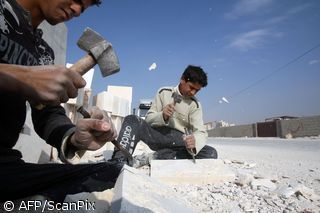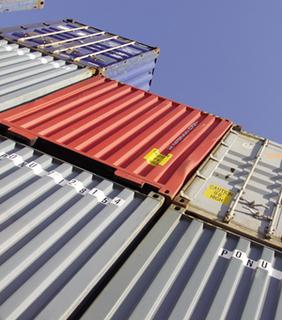WTO negotiators reach tentative accord on major global trade issues
Published:
5 August 2004 y., Thursday
Key trade ministers tentatively agreed Saturday on a plan to end export subsidies on farm products and cut import duties around the world, a key step toward a comprehensive global accord under discussion since 2001, trade officials said.
The deal was expected to be approved by all 147 members of the World Trade Organization later Saturday, opening the way for full negotiations to start in September.
"Developed countries have recognized that agricultural trade with a heavy subsidy component is not free trade," said Indian Trade Minister Kamal Nath.
But he said the United States, European Union and other developed countries will also benefit by removing heavy agricultural subsidies from their budgets.
Ken Ritter, president of the Canadian Wheat Board, said he's concerned the tentative deal would break a promise the Canadian government made to protect the grain marketing monopoly. In a breakthrough Saturday some 20 key countries approved a document setting out the framework for a legally binding treaty, World Trade Organization spokesman Keith Rockwell said.
The document will commit countries to lowering import duties and reducing government support in the three major areas of international trade - industrial goods, agriculture and service industries, such as telecommunications and banking.
The deal sets back in motion the long-stalled "round" of trade liberalization treaty talks that were launched by WTO members in Doha, Qatar, in 2001 but delayed by the collapse of the body's ministerial meeting in Cancun, Mexico, last year.
In agriculture, the document agrees to eliminate export subsidies and other forms of government support for exports, while making big cuts to other subsidies. It includes a "down payment" that would see an immediate 20-per-cent cut in the maximum permitted payments by rich countries.
Šaltinis:
Canadian Press
Copying, publishing, announcing any information from the News.lt portal without written permission of News.lt editorial office is prohibited.
The most popular articles
 The European Commission has approved, under EC Treaty state aid rules, an Italian framework temporarily adapting certain existing risk-capital schemes to increase companies' financing possibilities during the current economic crisis.
more »
The European Commission has approved, under EC Treaty state aid rules, an Italian framework temporarily adapting certain existing risk-capital schemes to increase companies' financing possibilities during the current economic crisis.
more »
 The European Commission has authorised, under EC Treaty state aid rules, a Maltese measure to help businesses to deal with the current economic crisis.
more »
The European Commission has authorised, under EC Treaty state aid rules, a Maltese measure to help businesses to deal with the current economic crisis.
more »
 We're making progress. That's the word from Treasury Secretary Tim Geithner about settling the financial markets.
more »
We're making progress. That's the word from Treasury Secretary Tim Geithner about settling the financial markets.
more »
 According to a new report released by NextGen Research, global markets for financial kiosks and enhanced ATMs will grow at a compound annual rate of 9 percent, to include more than 186,000 financial kiosks and nearly 2.5 million ATMs by 2013.
more »
According to a new report released by NextGen Research, global markets for financial kiosks and enhanced ATMs will grow at a compound annual rate of 9 percent, to include more than 186,000 financial kiosks and nearly 2.5 million ATMs by 2013.
more »
 Non-farming Latvians are buying pigs to beat the economic crisis.
more »
Non-farming Latvians are buying pigs to beat the economic crisis.
more »
 Is your money well spent at EU level? Every year, in April, the EP concludes its examination of EU spending for the financial year closed 16 months previously.
more »
Is your money well spent at EU level? Every year, in April, the EP concludes its examination of EU spending for the financial year closed 16 months previously.
more »
 In the construction sector, seasonally adjusted production1 decreased by 1.0% in the euro area2 (EA16) and by 2.1% in the EU272 in March 2009.
more »
In the construction sector, seasonally adjusted production1 decreased by 1.0% in the euro area2 (EA16) and by 2.1% in the EU272 in March 2009.
more »
 Between 2000 and 2008, EU27 trade in goods with Russia more than tripled in value, with EU27 exports to Russia rising to 105 bn euro in 2008 from 23 bn in 2000.
more »
Between 2000 and 2008, EU27 trade in goods with Russia more than tripled in value, with EU27 exports to Russia rising to 105 bn euro in 2008 from 23 bn in 2000.
more »
 The European Commission has launched today a call for proposals covering key energy infrastructure projects such as energy interconnections, offshore wind energy and carbon capture and storage as part of the implementation of the EEPR.
more »
The European Commission has launched today a call for proposals covering key energy infrastructure projects such as energy interconnections, offshore wind energy and carbon capture and storage as part of the implementation of the EEPR.
more »
 During its plenary session on 13 May 2009, the European Economic and Social Committee adopted a key opinion on responding to the crisis in the European automotive industry.
more »
During its plenary session on 13 May 2009, the European Economic and Social Committee adopted a key opinion on responding to the crisis in the European automotive industry.
more »